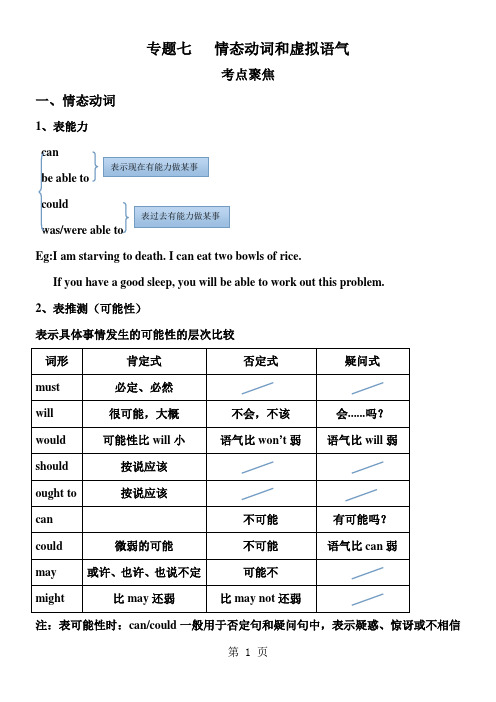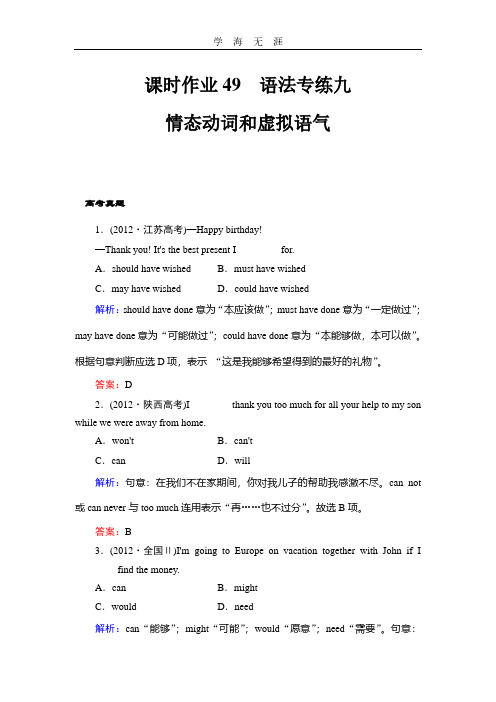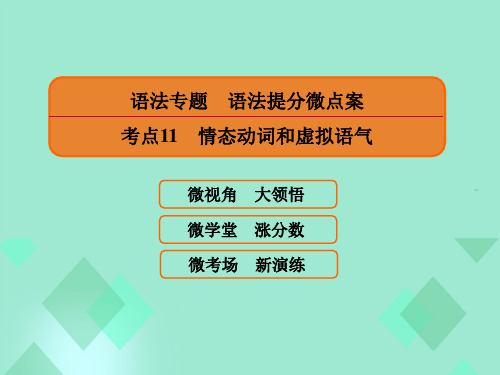【高考聚焦】2014届高三英语一轮复习综合训练 助动词类 第1节 情态动词和虚拟语气 Word版含解析
高三一轮复习 专题七 情态动词和虚拟语气讲解与练习

专题七情态动词和虚拟语气考点聚焦一、情态动词1、表能力can表示现在有能力做某事be able tocould表过去有能力做某事was/were able toEg:I am starving to death. I can eat two bowls of rice.If you have a good sleep, you will be able to work out this problem.2、表推测(可能性)表示具体事情发生的可能性的层次比较词形肯定式否定式疑问式must 必定、必然will 很可能,大概不会,不该会......吗?would 可能性比will小语气比won’t弱语气比will弱should 按说应该ought to 按说应该can 不可能有可能吗?could 微弱的可能不可能语气比can弱may 或许、也许、也说不定可能不might 比may还弱比may not还弱注:表可能性时:can/could一般用于否定句和疑问句中,表示疑惑、惊讶或不相信等,could也可用于肯定句;may/might表可能性不大,不用于疑问句;Eg:That can’t be Mary, for she is in hospital.(表不相信)He might be doing his homework now.They asked if we would do that again.We should arrive home before dark.You must be tired after the long journey.3、表请求、允许can/could表请求:could不表过去,只表示委婉、客气的语气,但回答时必须用can. may/might表请求:might 不表过去,仅表示语气更加委婉。
will/would表请求:用于第二人称的疑问句。
shall表请求:用于第一、三人称的疑问句。
2014届高考英语一轮复习语法精讲《情态动词》PPT课件

返回目录
【翻译句子】 1.You shouldn't judge a stranger always by the clothes he wears. 你不应当总是以貌取人。 2.Parents ought to send their children to school when they reach seven years old. 当孩子满七岁时,家长应该送孩子去上学。 3. You should keep your promise. 你应该信守诺言。 【结论2】should也可表示劝告、建议语气,表示从法 律上或从道义上“应该”。 “应该”,表义务、责任,
【翻译句子】 (11 )因为他的腿断了,他不得不躺在床上。 As he had broken his leg, he had to lie in bed. 【结论 2】have to 表示“必须,不得不”,着重强调 客观需要,能用于更多时态(过去式和将来式)。 【翻译句子】 (12)走了很远的路你一定饿了。 You must be hungry after the long walk. 【结论 3】must 表示有把握的推测,意为“一定,肯 定”,用于肯定句中。
must作“必须”讲时,其否定式是“needn‘t”,表示“不必”
① — May I take this book out of the reading room? —No, you mustn't. You read it here. —我可以把书拿出阅览室吗? —不,决不可以,你在这儿读。 ② --- May I use your car? --- No, you mustn’t. \ Sorry, but I’m using it now. \ You’d better not. \ I'm afraid not.
2014届高考英语一轮复习语法精讲《情态动词》PPT课件

【疑难1】 That will be the man you want to see. Perhaps she would be willing to meet us. 【疑难剖析1】表示说话人的推测,意为“大概, 也许”。would 的肯定性不如will强,语气比较弱。
【完成例句】 (13)你可以教我怎样驾车吗? Would you teach me how to drive a car? (14)当你看见他能给他捎个便条吗? Will you please give him a message when you see him? 【结论2】用于第二人称的疑问句中表示有礼貌的 询问和请求,would 比 will更委婉。
【翻译句子】 (5)Could / Can I borrow your reference books? 我可以借下你的参考书吗? (6)You can smoke in the entrance hall. 你可以在入口大厅抽烟。 【结论4】表示允许、许可,用could 比 can更 委婉客气。
【翻译句子】 (3)Could you wait a few days for the money? 钱你可以再等几天吗? (4)Could you be here at eight o'clock tomorrow morning? 你能明天早上8点钟到这儿吗? 【结论3】表示请求、建议,用could 比 can语 气更委婉(回答用原形)。
【翻译句子】 (7) He might come tomorrow. 他可能明天来。 (8) He may be very busy these days. 他这些天可能很忙。 【结论2】表示可能性,表示“或许,大概”。用 于肯定句或否定句中,用might 比 may语气更加不 肯定。
2014年高考英语总复习专项专练:情态动词和虚拟语气(人教版,含2013模拟解析).pdf

课时作业49语法专练九情态动词和虚拟语气高考真题1.(2012·江苏高考)—Happy birthday!—Thank you! It's the best present I ________ for.A.should have wished B.must have wishedC.may have wished D.could have wished解析:should have done意为“本应该做”;must have done意为“一定做过”;may have done意为“可能做过”;could have done意为“本能够做,本可以做”。
根据句意判断应选D项,表示“这是我能够希望得到的最好的礼物”。
答案:D2.(2012·陕西高考)I________ thank you too much for all your help to my son while we were away from home.A.won't B.can'tC.can D.will解析:句意:在我们不在家期间,你对我儿子的帮助我感激不尽。
can not 或can never与too much连用表示“再……也不过分”。
故选B项。
答案:B3.(2012·全国Ⅱ)I'm going to Europe on vacation together with John if I ________ find the money.A.can B.mightC.would D.need解析:can“能够”;might“可能”;would“愿意”;need“需要”。
句意:如果我能找到那笔钱,我打算和约翰一起去欧洲度假。
故选A项。
答案:A4.(2012·江苏高考)Days later, my brother called to say he was all right, but ________ say where he was.A.mustn't B.shouldn'tC.wouldn't D.mightn't解析:mustn't意为“禁止,绝对不可”;shouldn't意为“不应该”;wouldn't 意为“不愿意,不想”;mightn't意为“可能不,也许不”。
超实用高考英语复习:情态动词和虚拟语气——高考英语一轮复习知识强化课件

3.may (1)表示请求、许可,比can正式。 ※May I use your computer? (2)表示推测,谈论可能性,意为“可能,或许”,一般用于肯定句中。 ※I think he may be ready for a sleep soon. (3)may的过去式为 might。might 也可以表示可能性低于may(此时might没有 过去式的意思)。 ※He said he might not be back until tonight. (4)表示希望、祈求、祝愿,常可译为“祝愿”。通常是用may+主+v.。 ※May all of our wishes come true this Valentine’s Day.
【考点二】常考情态动词的用法
1.can (1)表示能力,一般译为“能、会”,尤其指生来具备的能力。 ※Can you speak English? (2)表示许可,常在口语中。 (3)表示推测,意为“可能”,常用于否定句和疑问句中,此时can’t译为“不可 能”。 ※Can the news be true? ※The moon can’t always be full.
2.could (1)can的过去式,意为“能、会”,表示过去的能力。 ※I didn’t know if I could raise a child by myself. (2)could在疑问句中,表示委婉请求的语气,此时could没有过去式的意思。 ※Could you give me some advice on the best way to do this?
8.should (1)should 意为“应该”,可表示劝告、建议、义务、责任等。 ※We should do everything we can to maintain world peace. (2)should have done 意为“本应该做某事而没做”,表示对过去动作的责备、批评。 ※I should have arrived ten minutes ago but I missed the bus.
高三英语一轮复习 语法提分微点案 考点11 情态动词和虚拟语气课件

4.I've ordered some pizza, so we __n_e_e_d___ not worry about cooking when we get home tired.
解析:句意:我已经预订了一些比萨饼,所以当我们到家感到累的时 候就不必担心做饭的事了。根据句意可知答案为need。
(2) 与 过 去 情 况 相 反 : 从 句 用 过 去 完 成 时 , 主 句 用 would/could/might/should+have done。
(3)与将来情况相反:从句用过去式(did)/should+do/were to do,主句 用would/could/might/should+do。
5.I still remember my happy childhood when my mother __w__o_u_ld__ take me to Disneyland at weekends.
解析:句意:我仍然记得我快乐的童年,那时候我妈妈常常在周末带 我去迪斯尼乐园。would“过去常常”。
7.It is required by law that a driving test __(s_h_o_u_l_d_)_b_e_t_a_k_e_n_ (take) before a man gets a license.
解析:句意:法律规定,一个人在获得驾照之前要先参加驾照考试。 It is required that ...中,that从句的谓语动词用“should+动词原形”,其中 should 可 以 省 略 ; 又 因 为 test 与 take 之 间 是 被 动 关 系 , 故 用 被 动 语 态 , 即 (should)be taken。
5.虚拟语气在其他从句中的运用 (1)would rather所接的从句中的谓语动词用一般过去式(对现在虚拟)或 者过去完成式(对过去虚拟) I would rather you stayed at home now. 我宁愿你现在待在家里。 (2)It is (high) time (that) ...句型中谓语动词用一般过去式或should+动 词原形,其中should不可省略 It's high time that we left/should leave. 该到我们离开的时候了。
高考英语一轮复习 考点对接模拟题摸底专练 虚拟语气 情态动词
虚拟语气+情态动词1.(2014年安徽省合肥市高三第三次教学质量检测)29. Whenever we went to my uncle's house, we ______ play in the garden.A. shouldB. wouldC. couldD. might【考点】考察情态动词用法【答案】B【解析】should应该;would会,过去常常做某事;could能够;might也许;句义:物理合适我们去叔叔家,我们都会在他的花园里玩耍。
去年前半句是一个Whenever we went to my uncle's house可知叙述的是过去发生的事情,所以使用would表示过去常常。
故B正确。
【试题延伸】在平时的学习中既要注意情态动词的基本含义,也要注意情态动词的特殊意义,如must偏偏,非得;should竟然;mustn’t禁止,千万不能;等等。
情态动词Shall用于所有人称,表示命令,警告,允诺;以及法律规定中要做的事情。
【举一反三】——ItA.willB.wouldC.shouldD.must〖答案〗C〖考点〗考查情态动词的区别。
〖解析〗will可用来表示“意愿;客观必然性等”;would可表示“意愿;过去常常(现在也可能是那样的)”;should表示“应该, 理应”;must表示“必然;一定, 准是”。
结合语境可知, 此处用should表示虚拟。
句意为:“这本来应该是美丽的, 但是现在它被严重污染了。
”2.(2014年北京市西城区高三5月二模试题)28. It was unusual that such close neighbors ______ not know one another.A. couldB. wouldC. mustD. should【考点】考察情态动词【答案】D【解析】情态动词could能够,可能;would会;must必须,一定,非得;should应该,竟然;句义:如此亲密的邻居竟然相互不认识真是太不同寻常了。
【备战2014,教师原创】2014年高考英语语法备考 情态动词 课件
13. –Did you visit the famous museum?
14. – I didn’t take notes at yesterday’s meeting because I had left my pen at home. C mine. I ____ it. -- You ____ A. must have borrowed; wasn’t using B. may have borrowed; didn’t use C. could have borrowed; wasn’t using D. should have borrowed; hadn’t used
shall 用于第一,第三人称疑问句中,表示说话人 征求对方的意见或向对方请求. 1)When shall he be able to leave the hospital? 2)Shall we begin our lesson?
6. Mr. Smith is always on time for everything. A it be that he was late for the How ______ flight? A. can B. should C. may D. must can用于疑问句,表猜测 must 只能用在肯定句中表猜测.
if only +had done 与过去事实相反,要是我们还没有 出发就好了,事实上我们已经出发. will 将要做某事 be going to 准备做某事,好象某事要发生/有可能发生.
12. It is necessary that people both young and A some English to be old in China ______ prepared for the Olympic Games to be held in Beijing in 2008. A. learn B. will learn C. must learn D. shall learn It is necessary that +主+should +v.原。 It is necessary/ strange/ important that sb should do sth. 虚拟语气用在主语从句中还有下面的结构: It is suggested/ decided/ ordered/ requested/ proposed/…that sb should do sth.
- 1、下载文档前请自行甄别文档内容的完整性,平台不提供额外的编辑、内容补充、找答案等附加服务。
- 2、"仅部分预览"的文档,不可在线预览部分如存在完整性等问题,可反馈申请退款(可完整预览的文档不适用该条件!)。
- 3、如文档侵犯您的权益,请联系客服反馈,我们会尽快为您处理(人工客服工作时间:9:00-18:30)。
1.—He looks very hot and dry.—So ______ if you had a temperature of 103.A. would youB. will youC. would you have beenD. do you【解析】A句意:——他看起来很热,很渴。
——如果你发烧到103(华氏)度,你也会这样的。
根据句意可知,这是一个与现在事实相反的假设,主句可使用“主语+would/could/might+动词原形”形式,故选择A项。
“so+助动词/情态动词/系动词+主语”意为“……也一样”。
2.—Jack, turn off the TV! Isn't it high time that you ______ John's birthday party?—I get it, mom!A. must leave forB. will leave forC. left forD. is leaving for【解析】C句意:——杰克,关掉电视!难道你不该去参加约翰的生日聚会了?——知道了,妈妈。
“It+is+(high/about)time+(that)+主语+过去式/should do/be”是个常用句型,意为“到……的时候,应该……”。
3.It is beyond my understanding that many adults ______ be so crazy about Harry Potter series.A. willB. canC. mayD. should【解析】D句意:很多成年人居然对哈利·波特系列这么上瘾,对此我不能理解。
这里用should表示“居然,竟然”。
其他选项都没有这个含义。
4.I'm as busy as a bee;______ you bother me with so many questions now?A. mayB. mustC. canD. shall【解析】B句意:我忙得不可开交;为什么你偏要现在拿这么多的问题来打扰我呢?must表示与说话人相反的愿望或语气不耐烦,意为“偏偏,偏要”。
5.The school recommends parents ______ their children to swim in rivers or lakes during summer holidays.A. not permitB. do not permitC. mustn't permitD. couldn't permit【解析】A句意:学校建议家长在暑假期间不允许孩子在河里或湖里游泳。
recommend后的宾语从句用虚拟语气should not permit,而should可以省略。
6.The job required ______ did it ______ careful and brave enough.A. who; youB. whom; wasC. whomever; wereD. whoever; be【解析】D句意:这项工作要求任何一个做这项工作的人必须足够地胆大心细。
第一个空格处既要引导宾语从句还要作从句的主语,需要使用whoever;英语中的某些动词,如require,suggest,advise,request,propose等的后面接宾语从句时,从句要使用“(should)do /bedone/be”形式,故选择D项。
7.It's too bad that I failed in the math exam. If only I ______ hard at it!A. workedB. had workedC. has workedD. would work【解析】B句意:我数学考试不及格,这真是太糟糕了;要是我之前努力学习了该多好。
if only意为“要是……多好”,它后面的从句要用虚拟语气。
根据句意可知,此处是与过去事实相反的假设,要使用过去完成时。
8.A survey has shown that 40% of those killed in traffic accidents ______ if they had been wearing seat belts.A. should have been savedB. must have been savedC. need have been savedD. could have been saved【解析】D句意:一份调查已经显示在交通事故中40%的死亡人员本来能够被救的,如果他们之前一直系着安全带的话。
could have done本来能够……;should have done本该做而实际上没有做;must have done想必是,一定是;need have done本来需要做而实际未做。
9.You ______ make mistakes, but that is the way you learn how things work and how to mend them.A. mayB. mustC. needD. will【解析】A句意:你可以犯错误,但那也是你了解事情是如何发展和应该如何补救的方法。
考查may表示“可以”。
10.Suppose you could go camping this weekend, how ______ you feel?A. willB. wouldC. canD. do【解析】B句意:假设你本周末去野营,你会是怎样的感觉?suppose引导的从句相当于if引导的条件状语从句,句子中的主、从句皆与将来事实相反,故主句谓语动词应为:would/should/could/might+动词原形。
11.—This city is a dull place to live in.—How surprising that you ______ think so! I love it very much.A. shallB. mustC. mightD. should【解析】D句意:——住在这个城市真无聊。
——你竟然这么想,真叫人吃惊!我很喜欢它。
本题考查情态动词。
should用在某些形容词(important,necessary,natural等)之后的that从句中,意为:竟然,表示惊讶的语气。
12.—Tom is still unhappy today.—It's all your fault. You ______ to him yesterday for your mindless mistake.A. should apologizeB. should have apologizedC. shouldn't have apologizedD. must apologize【解析】B句意:——汤姆今天还不高兴。
——都怪你。
你昨天本应该为你愚蠢的错误道歉。
B:过去本该做却未做;A、D:指现在或将来;C:过去本不该做却做了。
13.My demand is that the information referred to in my report ______ to Mr. Brown without delay.A. to be e-mailedB. e-mailedC. be e-mailedD. being e-mailed【解析】C句意:我的要求是,我报告中提到的信息要立刻通过电子邮件发给布朗先生。
英语中的某些名词,如demand,request,requirement,suggestion,advice,proposal等的后面接同位语从句或表语从句时,从句中要使用虚拟语气,即“(should)do/be done”形式。
14.I'd rather ______ rudely to her yesterday.A. you not speakB. you not speakingC. you didn't speakD. you hadn't spoken【解析】D句意:我宁愿你昨天没有那么粗鲁地与她说话。
would rather后的宾语从句需要使用虚拟语气。
本题中的yesterday说明此题要使用与过去事实相反的假设,即从句使用过去完成时。
15.They were offered two free tickets to the USA. Otherwise, they ______ able to afford to go.A. had never beenB. have never beenC. would never beD. would never have been【解析】D句意:有人给他们提供了两张去美国的免费机票。
否则,他们将永远不能负担得起去美国(的开支)。
根据句意和They were offered…可知Otherwise实际指代的条件状语从句是If they hadn't been offered two free tickets to the USA;题干中涉及的是与过去事实相反的假设,主句要使用would/could/should/might have done。
16.You could understand what he is referring to if you ______ his lecture yesterday.A. attendedB. had attendedC. have attendedD. would have attended【解析】B句意:如果你昨天听了他的演讲的话,你就能理解他正在指的是什么了。
根据句意可知,题干中涉及的是与过去事实相反的假设,故使用过去完成时态。
17.How I wish I ______ in medicine instead of history when I was at college!A. had majoredB. should majorC. majoredD. would majored【解析】A句意:我是多么希望在上大学时我选择了主修医学而不是主修历史!题干中wish后表示的是与过去事实相反的假设,故使用过去完成时态。
18.It is important to know about the cultural differences that ______ cause problems.A. mustB. dareC. mayD. shall【解析】C句意:了解有可能会带来麻烦的文化差异是重要的。
